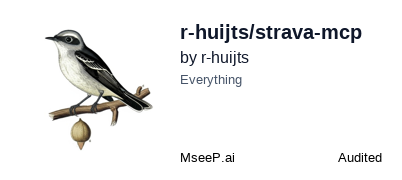Capabilities
Overview
The Strava MCP Server bridges the gap between a cyclist’s or runner’s data on Strava and the conversational AI world. By exposing the full breadth of the Strava API through the Model Context Protocol, it allows LLMs to query and manipulate a user’s activities, segments, routes, clubs, and performance metrics with natural language. This eliminates the need for developers to write custom OAuth flows or parse JSON responses, letting them focus on higher‑level logic and user experience.
What Problem Does It Solve?
Many fitness apps rely on Strava for its rich activity tracking and community features. However, integrating Strava into an AI‑driven workflow is cumbersome: developers must manage authentication, paginate large datasets, and translate raw API responses into meaningful insights. The Strava MCP Server abstracts all of this complexity behind a single, well‑defined interface. It handles authentication tokens, request throttling, and data normalization, delivering AI‑friendly JSON that can be consumed directly by LLMs via MCP. This makes it trivial to build chatbots, coaching assistants, or data‑analysis tools that can ask for “my last three rides” or “export my favorite route as GPX,” without any backend plumbing.
Key Features & Capabilities
- Comprehensive Activity Access – Retrieve recent activities, detailed streams (heart rate, power, cadence), and segment efforts in a single call.
- Segment Management – Explore, star, unstar, and fetch detailed segment data, including location coordinates and elevation profiles.
- Route Handling – List saved routes, view metadata, and export them in GPX or TCX format directly to the filesystem.
- Club Information – Query club membership and retrieve club details.
- AI‑Friendly JSON – Every response is wrapped in a consistent MCP payload, ready for LLM consumption.
- Strava V3 Compatibility – Uses the latest stable API, ensuring continued support and access to new features.
Real‑World Use Cases
- Personal Coaching Bots – A virtual coach can pull the latest ride data, analyze power curves, and generate actionable feedback or visual dashboards.
- Performance Tracking Dashboards – Teams can embed an AI assistant that pulls club statistics, segment records, and historical trends for real‑time insights.
- Route Planning Assistants – Users can ask the assistant to export a route as GPX for use in GPS devices or other mapping tools.
- Community Engagement – Bots can recommend new segments near a user’s location, star them automatically, or report on club activity.
Integration with AI Workflows
Developers can embed the Strava MCP Server into any LLM‑powered application by simply adding it to the server list in their MCP client. Once connected, a single tool invocation can replace multiple REST calls: “Get my heart rate data from yesterday’s run” becomes a single, natural‑language query that returns structured JSON. The server also supports advanced prompts—such as a cycling coach analysis—that can instruct the LLM to generate interactive dashboards or coaching notes, all powered by real Strava data.
Unique Advantages
- Zero Boilerplate – No need to write custom OAuth handlers or data parsers; the server handles everything.
- Rich, Structured Data – Activities, streams, and segments are returned in a format that is immediately usable by LLMs for reasoning or visualization.
- Extensibility – Because it follows MCP standards, the server can be combined with other data sources (weather APIs, training logs) to create holistic fitness assistants.
- Developer‑Friendly – Written in TypeScript, the server is easy to audit and extend for custom business logic or additional Strava endpoints.
By turning Strava’s extensive dataset into an AI‑ready service, the Strava MCP Server empowers developers to build intelligent fitness tools that can understand and act on user data with natural language precision.
Related Servers
MarkItDown MCP Server
Convert documents to Markdown for LLMs quickly and accurately
Context7 MCP
Real‑time, version‑specific code docs for LLMs
Playwright MCP
Browser automation via structured accessibility trees
BlenderMCP
Claude AI meets Blender for instant 3D creation
Pydantic AI
Build GenAI agents with Pydantic validation and observability
Chrome DevTools MCP
AI-powered Chrome automation and debugging
Weekly Views
Server Health
Information
Explore More Servers
Context Crystallizer
Turn codebases into AI‑ready knowledge gems
MCP Notion
Bridge to Notion via MCP API
Mcp Editor
Direct file editing via MCP
MCP to LangChain/LangGraph Adapter
Bridge MCP tools into LangChain and LangGraph pipelines
Phone Carrier Detector MCP Server
Fast, memory‑based Chinese mobile number lookup
Memorious MCP
Local, private semantic memory for AI assistants
